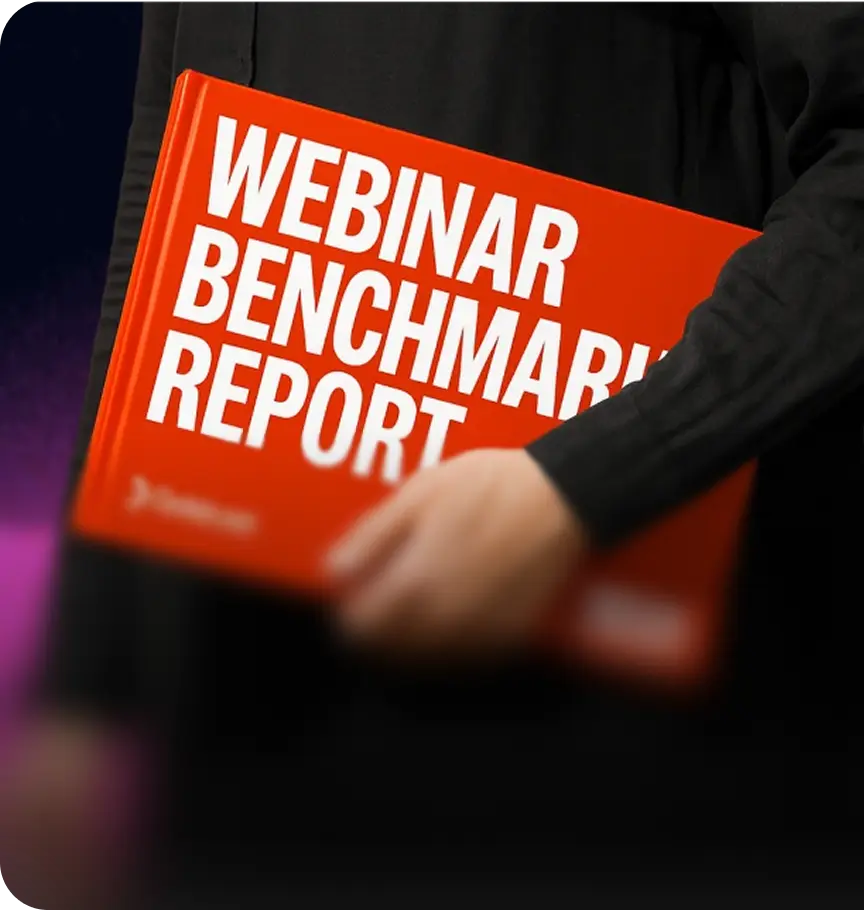The Great Debate: Who Should Own Post-Event Follow-Up?

Maximize Your Marketing ROI
Join 10,000 other marketers already getting the best tips on running engaging events that boost pipeline and create raving fans.
Marketing versus sales, a tale as old as time.
For the record—we don’t see these two teams as adversaries but as partners! 🤝
However, we couldn’t resist adding a little rivalry in the name of good fun for our latest event.
Aleksandra Panyukhina, B2B Field & Event Marketing Leader, and Katie Morrissey, Head of Business Development here at Goldcast, went head to head on all things post-event follow-up.
They debated pressing topics like:
- Who should own the post-event follow-up—marketing or sales?
- Are “t-shirt leads” worth any outreach effort?
- Should all event registrants get the same level of follow-up priority?
…and much more!
Afterward, the team led a live teardown of real post-event follow-ups and talked about the good, the bad, and their thoughts on how they could be improved.
Things got spicy, to say the least. 🌶️
Dive into our quick recap below, and be sure to check out the full debate on-demand.
🥊 Debate #1. Sales should not follow up after an event; marketing should.
Aleksandra:
When it comes to post-event follow-up, the most important thing for the first touch is that it happens fast and adds value to all registrants—whether they attended or not. This first communication is a common courtesy.
So, the first follow-up should come from marketing. It should provide the on-demand recording, additional content related to the event, and thank folks for either registering or joining.
The next touch is where things get interesting. Are the leads relevant to sales? A target account? Is it the right moment to reach out?
Selected contacts should be passed off to the sales team and enrolled in appropriate sequences. The rest should stay with marketing for additional marketing, future events, etc.
Katie:
I think the follow-up depends on if they attended the event. If they did attend, sales should follow up. If they did not attend, marketing should follow up.
The way that sales follows up is very important. It shouldn’t just be a meeting request. Instead, sales should ask the attendee about the event, start a conversation, and then ask for a call if it makes sense.
For folks that did not attend, marketing should send out the recording and keep the list in mind for future events.
You should also think about the account versus the lead. Someone that registered might not be a relevant lead, but they are representing a great account. In this case, you could personalize the outreach to keep the conversation going and try to get the right intro.
Aleksandra:
I’m on the fence when it comes to segmentation based on attendance. It’s so easy not to attend an event. Just because someone doesn’t come doesn’t mean they aren’t interested in the topic. I truly believe there’s an opportunity to have meaningful conversations with these folks.
I’ve personally seen some events where there’s higher engagement from folks who did not attend an event versus the people who did attend. This just goes to show that if you reach the right audience, they are interested, they want what from you, and it’s a natural moment to use intent signals to start conversations.
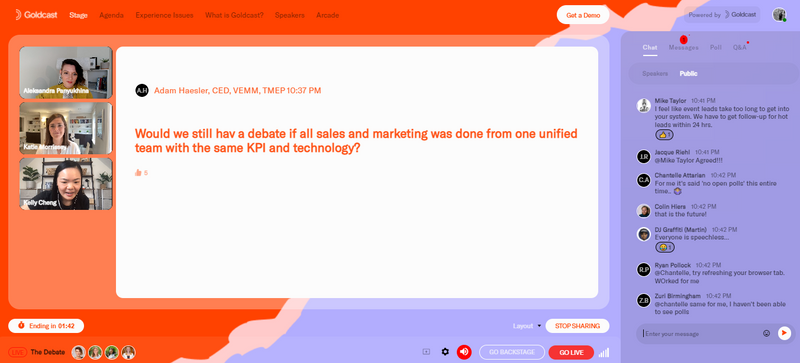
🥊 Debate #2. All event leads should be followed up on with the same urgency, no matter the type of event.
Aleksandra:
I don’t think all leads require the same urgency, especially when you start comparing event leads to other sources, like an inbound demo request. The response time to an inbound demo request should be minutes versus an event where hours or even a day after the event is an appropriate follow-up window.
Events are a softer lead with a different intent. You don’t want to be pushy.
It’s also important to understand that the moment when event leads come into the system and queue, it’s different. If you get the lead from the trade show, it’s usually after the event is over. In that situation, it’s very urgent to follow up quickly since a lot of time has already passed.
If it’s your own event—in person or digital—and the registration is managed on your end, there’s less urgency. You own all of this data and can plan the next steps well in advance.
On the opposite end of the spectrum, you’re going to want to keep the sales team in the loop on timelines, so they don’t jump the gun and follow up too early. You don’t want to follow up immediately after someone registers because they haven’t even gotten what they signed up for yet—the event.
If you have a long lead time between people signing up and actually attending an event, it can be good to build a relationship during that period. Have a BDR become an event buddy, share news about the event, behind the scenes, resources, etc. This could even start organic conversations before the event happens.
For me, it depends on the event type and the carefully curated strategy that you have.
Katie:
“Speed to lead”—you hear this all the time in sales. If someone attends an event or if they request a demo while it’s top of mind, you should be reaching out immediately.
This also speaks to the importance of getting this info in your marketing automation platform and CRM. The faster you can get that information synced, the quicker you can reach out, and the more top of mind that experience will be.
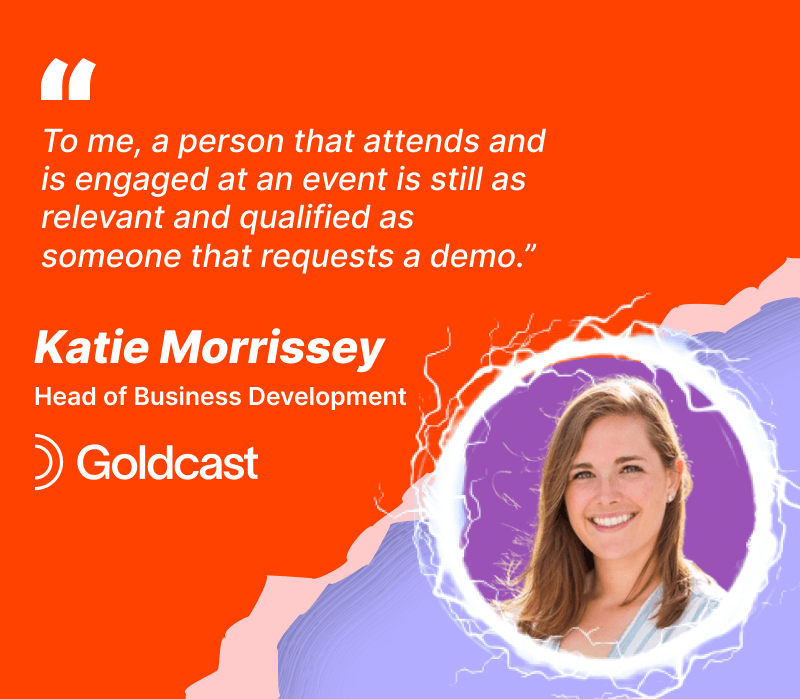
The ask is different. If it’s a lead that you’re not sure about or it's an early conversation, you're not asking for the meeting.
If someone attends an event virtually, that will present the same level of “urgency” as an in-person engagement. Think about it—you wouldn’t follow up right after you meet someone at a trade show and ask for a call while they’re on the plane ride home.
To me, a person that attends and is engaged at an event is still as relevant and qualified as someone that requests a demo.
Aleksandra:
It sounds like we have opposite views here on the urgency. To me, there’s a difference between the urgency of in-person events versus virtual events.
An in-person engagement means higher intent, and you want to continue that conversation faster versus virtual events.
I know I sign up for so many virtual events; they’re just so prevalent now, and there’s no way I can attend every single one live. And even the ones I do attend aren’t necessarily relevant to me in terms of making a purchase. Then, I am typically bombarded with generic emails, and it’s overwhelming. The ask is not right.
If I’m at the in-person event, however, I don’t mind going more in-depth. In-person is more top-level, and you want to follow up for more.
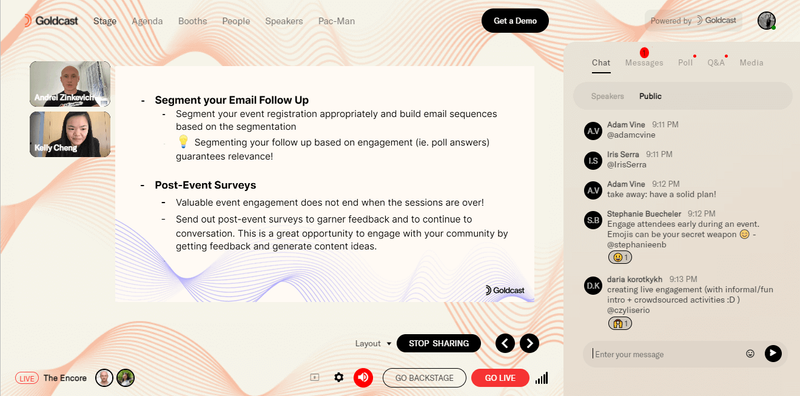
🥊 Debate #3. Booth and t-shirt leads are NOT worth the sales team’s attention.
Katie:
This really goes back to who you have working the booth. If there’s a sales team manning the booth, the idea is for the salesperson to turn that “t-shirt” lead into a conversation. Instead of just giving away swag, it’s up to the sales rep to drive urgency.
It could be a simple opener like, “Hey! Thanks for dropping by. What do you think about the future of events? Are hybrid events on your radar?”—something relevant to the event content or industry.
It’s up to the event staff to turn it into something else.
I think sales teams should staff the booths. The goal is to drive leads and conversations. Salespeople can also prospect into other accounts and partners while they’re there.
Aleksandra:
I think that every lead is worth attention, especially because in-person events can be so expensive. Sometimes a t-shirt lead costs you more than just a conversation because there’s the cost of the t-shirt, so you want to make it work.
It is important to try and start a conversation versus just giving away free stuff. Not every person will be hooked, but it can work.
For example, I worked an event where we had cute plush toys as a giveaway. We had C-level executives stopping by to pick up souvenirs for their kids back at home. Along the way, we’d engage these folks in conversations and met a lot of great leads.
It’s not about whether or not they want the swag. It’s about how you turn their need for swag into a conversation.
The training before the show should be mandatory. How you present the product, how you talk to attendees, how you behave at the event, what activities you participate in - etc. You need someone who is willing to actively engage with folks visiting the booth.
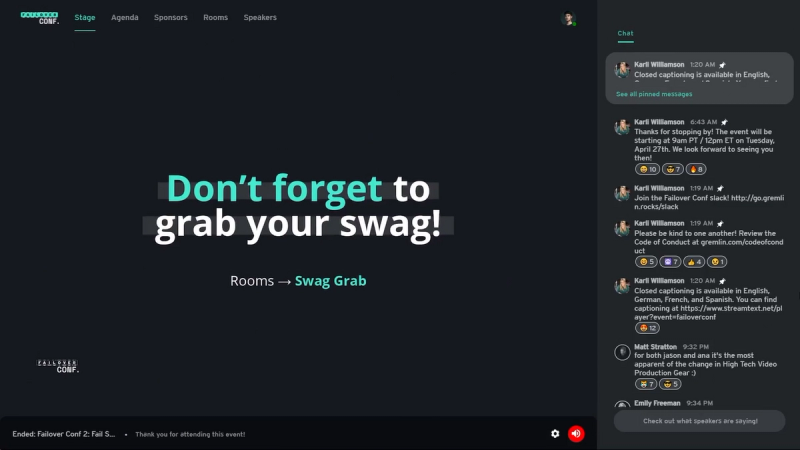
🥊 Debate #4. The first follow-up of a hot lead doesn’t have to be from the person they engaged with at the event
Aleksandra:
It doesn’t have to be, but it’s really good when it is. I truly believe that continuing that connection with someone they talked to is the best way to get a response—whether that’s someone they met at the booth, the host of a webinar or a speaker on-stage at the event.
This can increase the chance of further engagement. To me, here’s where the first marketing follow-up that can be automated to come from anyone in the organization. It adds value and points out that another person will be reaching out. Then, the other colleague reaches out, bridges the gap between marketing and sales, and continues the conversation.
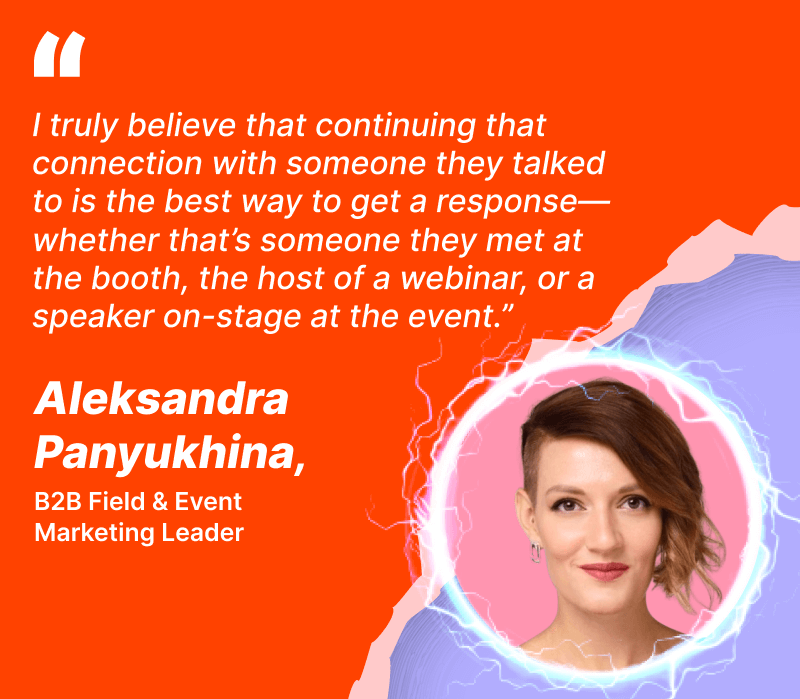
If it is a key account and we know the rep, it's important to follow existing procedures. If you meet someone and out of the blue they hear from a random person, there is a lack of personal touch. It takes less than five minutes to craft a personal email, so it’s worth the extra lift to provide a better experience. It’s a personal touch and a nice segway. It makes you feel like they care.
It should be personal and come from the person who you chatted with. This is the more human approach.
Katie:
Adding multiple contact points quickly gets messy with Salesforce and can cause tension among reps. If the account is in Salesforce, the owner is very clear.
I think it’s ok to follow up from another person. You simply copy the person that had the conversation to close the gap and eliminate issues between reps. Simply leverage the conversation for a proper introduction.
So, my perspective is different—it does not have to be the person that started the conversation. You can and should leverage that relationship to make it feel good for everyone, but the account owner should ultimately make contact.
However, if it’s not a contact or account already owned in Salesforce, then it’s ok to assign the new account to the person that had the conversation.
—
Who do you think won the great debate?? Be sure to watch the full webinar for even more hot takes on post-event follow-ups.

Transform Your Video Marketing with AI
Stay In Touch
Platform
Resources
© 2026 Copyright Goldcast, Inc. All rights reserved.



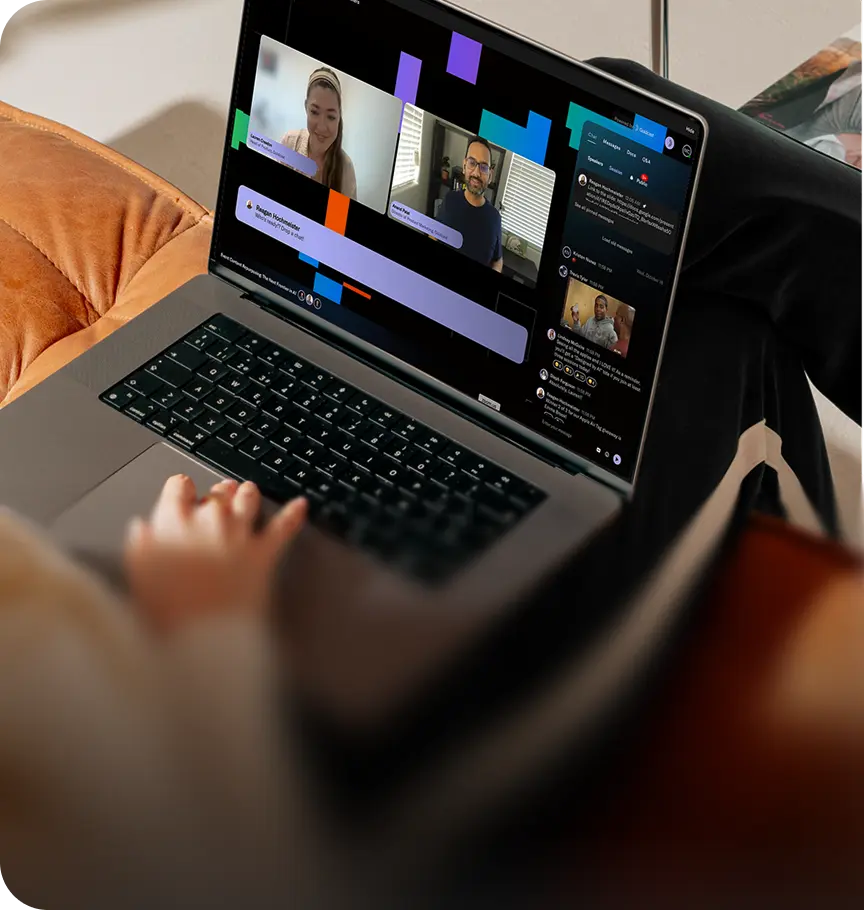

 Upcoming Events
Upcoming Events Event Series
Event Series On-Demand Events
On-Demand Events